police
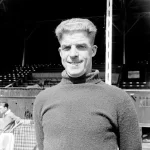 We all know that travel plans can be hampered due to weather conditions, and for drivers, one of the worst weather situations for driving is fog. Of course, weather can affect more than just travel plans. Over the years, we have seen many sporting events called for weather. Everything from snow, to rain, and even fog, although a game called for fog is probably less likely to happen than rain or snow. Still, it isn’t outside the realm of possibilities. It wouldn’t make good sense to try to catch a baseball in the fog. Someone is likely to get hurt. So, games would need to be called for fog, but maybe because a lot of games are played in the afternoon, the fog has had time to burn off.
We all know that travel plans can be hampered due to weather conditions, and for drivers, one of the worst weather situations for driving is fog. Of course, weather can affect more than just travel plans. Over the years, we have seen many sporting events called for weather. Everything from snow, to rain, and even fog, although a game called for fog is probably less likely to happen than rain or snow. Still, it isn’t outside the realm of possibilities. It wouldn’t make good sense to try to catch a baseball in the fog. Someone is likely to get hurt. So, games would need to be called for fog, but maybe because a lot of games are played in the afternoon, the fog has had time to burn off.
In one strange occurrence, during a soccer match between Charlton Athletic and Chelsea in 1937, in the United Kingdom, goalkeeper for the UK’s Charlton Athletic, 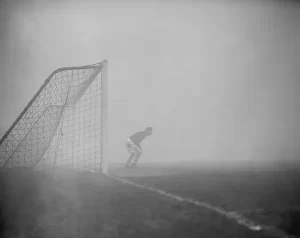 Sam Bartram once stood alone on the field for 15 minutes because he didn’t realize the game had been called off due to heavy fog. Now, if you ask me, that’s ludicrous. Why would he just stand there at the goal for 15 minutes after the game was called!!
Sam Bartram once stood alone on the field for 15 minutes because he didn’t realize the game had been called off due to heavy fog. Now, if you ask me, that’s ludicrous. Why would he just stand there at the goal for 15 minutes after the game was called!!
During the match, a thick fog rolled over the field. It was a very thick fog. The referees decided that this fog was so think that the players were not safe running all over the field, much less dodging a ball too. So, the match was called off, but somehow, Bertram didn’t hear the call, or the whistle or whatever was used to call the game, so he stood there at is post…the goal at the end of the field…alone. Somehow, no one told Bertram that the game had been called, probably because the couldn’t see that he was still out there. So, 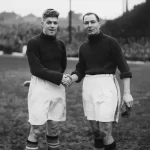 Bertram waited for 15 minutes for the ball to come his way…a full 15 minutes. That’s crazy. How could he have had no idea? Well, somehow Bertram just thought his team was on a “crazy offensive run, pinning down the Chelsea defense, but somehow failing to actually score a goal.” So, there he stood, until finally, a police officer went on the field, and with a look of shock, said something like, “What the heck are you doing? The game’s over, mate.” Well, a rather embarrassed Bartram shuffled off to the locker room, where he was met with unrestrained laughter by his rather rude teammates. They all knew that he was still out there, and no one had made the move to go get him. Well, Bertram got over it, because they were his teammates, and even if it was misguided, it was just a joke after all. I’m sure that after that, he stayed much more alert in the fog that tends to plague the United Kingdom.
Bertram waited for 15 minutes for the ball to come his way…a full 15 minutes. That’s crazy. How could he have had no idea? Well, somehow Bertram just thought his team was on a “crazy offensive run, pinning down the Chelsea defense, but somehow failing to actually score a goal.” So, there he stood, until finally, a police officer went on the field, and with a look of shock, said something like, “What the heck are you doing? The game’s over, mate.” Well, a rather embarrassed Bartram shuffled off to the locker room, where he was met with unrestrained laughter by his rather rude teammates. They all knew that he was still out there, and no one had made the move to go get him. Well, Bertram got over it, because they were his teammates, and even if it was misguided, it was just a joke after all. I’m sure that after that, he stayed much more alert in the fog that tends to plague the United Kingdom.
 When people are camping, the first rule is to make sure trash and leftover food are stored in airtight containers and that trash is disposed of far away from the campsite. The problem with food and trash left out in a campground is that the wild animals like the smell of these things, and they tend to come into camp at night when everyone is asleep. Before long the food they first found is gone, and they are looking for the next big score. Of course, not every animal is really dangerous when they get around food or trash, but many are. It is necessary to be careful around wild animals.
When people are camping, the first rule is to make sure trash and leftover food are stored in airtight containers and that trash is disposed of far away from the campsite. The problem with food and trash left out in a campground is that the wild animals like the smell of these things, and they tend to come into camp at night when everyone is asleep. Before long the food they first found is gone, and they are looking for the next big score. Of course, not every animal is really dangerous when they get around food or trash, but many are. It is necessary to be careful around wild animals.
By the same token, it isn’t unusual for campers to have their favorite beverage in the camp…often beer. And yes, humans tend to sometimes overdo their drinking and end up making fools of themselves because they are intoxicated. Sometimes they even get themselves into heated situations…ie arguments. Some people have even been kicked out of campgrounds for their intoxicated behavior, but we aren’t the only species that has a taste for alcohol. Believe it or not, animals like to indulge too, it they can get a hold of it.
One family found this out the hard way, in Port Hedland, Western Australia. It was the middle of the night, when a commotion was heard outside of a tent in the middle of the night. The campers turned on their torches and found a feral pig tearing open their supply of beer. By the time the pig finished the beer and headed off to look for food, it had consumed 18 cans of beer. Beer pretty much having the same kind of effect on the pig as it can on humans, the pig began to feel like he was invincible, so he decided to take on with a cow that was minding its own business nearby. Unfortunately, the pig came off on the losing end of the battle, when another 
 group of campers nearby, saw that the pig was being chased around their vehicle by a cow” Following the pig’s “ordeal,” the sheer amount of alcohol finally took its toll, and the pig passed out underneath a tree. Later, it was said that the police were reportedly trying to track down the pig. Apparently, the pig managed to elude the police and make its way home. What were the police planning to “charge” the pig with anyway…RUI (Running Under the Influence)??
group of campers nearby, saw that the pig was being chased around their vehicle by a cow” Following the pig’s “ordeal,” the sheer amount of alcohol finally took its toll, and the pig passed out underneath a tree. Later, it was said that the police were reportedly trying to track down the pig. Apparently, the pig managed to elude the police and make its way home. What were the police planning to “charge” the pig with anyway…RUI (Running Under the Influence)??
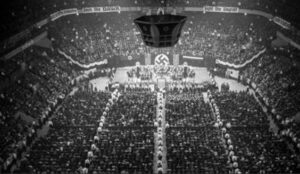
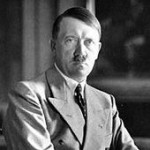 I think that we can all say that we have found ourselves on the wrong side of history…at the very least our belief system. That is really where most of the world found themselves when Adolf Hitler was elected to office, and almost immediately began to pour out his evil plan for the world, and his hatred for anyone not Aryan, which in Nazi ideology, “denotes white non-Jewish people, especially those of northern European origin or descent typically having blond hair and blue eyes and regarded as a supposedly superior racial group.” Hitler had so deceived the world, in fact, that just a short six and a half months before Hitler invaded Poland, New York City’s Madison Square Garden hosted a rally to celebrate the rise of Nazism in Germany!! More than 20,000 people were in attendance. They raised Nazi salutes toward a 30-foot-tall portrait of George Washington flanked by swastikas. Of course, not everyone was fooled by Hitler, and in fact the 20,000 were a very small percentage, but these 20,000 were, whether they ever understood it or not, on the wrong side of history, trying to follow a man who was insanely evil, murderous, and racist. Outside, police and some 100,000 protestors, who saw right through Hitler’s beliefs, gathered.
I think that we can all say that we have found ourselves on the wrong side of history…at the very least our belief system. That is really where most of the world found themselves when Adolf Hitler was elected to office, and almost immediately began to pour out his evil plan for the world, and his hatred for anyone not Aryan, which in Nazi ideology, “denotes white non-Jewish people, especially those of northern European origin or descent typically having blond hair and blue eyes and regarded as a supposedly superior racial group.” Hitler had so deceived the world, in fact, that just a short six and a half months before Hitler invaded Poland, New York City’s Madison Square Garden hosted a rally to celebrate the rise of Nazism in Germany!! More than 20,000 people were in attendance. They raised Nazi salutes toward a 30-foot-tall portrait of George Washington flanked by swastikas. Of course, not everyone was fooled by Hitler, and in fact the 20,000 were a very small percentage, but these 20,000 were, whether they ever understood it or not, on the wrong side of history, trying to follow a man who was insanely evil, murderous, and racist. Outside, police and some 100,000 protestors, who saw right through Hitler’s beliefs, gathered.
The organization who was behind the February 20, 1939 event, was the German American Bund (“Bund” is German for “federation”), had advertised the event as a “Pro American Rally.” The antisemitic organization held Nazi summer camps for youth and their families during the 1930s. Doesn’t that sound a lot like Hitler’s Youth Camps, that later turned into just the Hitler Youth, where he forcefully took children from their parents saying that the parents were ill-equipped to properly raise their children. Then, he turned those youth into killing machines, with no regard for human life. The Bund’s youth members were present at the February 20th rally, as were the Ordnungsdienst, or OD, the group’s vigilante police force who dressed in the style of Hitler’s SS officers. In Germany, these were the Jewish Ghetto Police or Jewish Police Service (German: Jüdische, Ghetto-Polizei, or Jüdischer Ordnungsdienst), also called the Jewish Police by Jews, and they were auxiliary police units organized within the Nazi ghettos by local Judenrat (Jewish councils). Their “job” was to keep order, or rather monitor the orderly persecution and murder of the Jewish people.
At the rally, there were banners hanging with messages like “Stop Jewish Domination of Christian Americans” and “Wake Up America. Smash Jewish Communism.” When the Bund’s national leader, Fritz Kuhn, gave his closing speech, he referred to President Franklin Delano Roosevelt as “Rosenfield” and Manhattan District Attorney Thomas Dewey as “Thomas Jewey.” Kuhn, a naturalized American who lost his citizenship during World War II, declared, “We, with American ideals, demand that our government shall be returned to the American people who founded it. If you ask what we are actively fighting for under our charter: First, a socially just, white, Gentile-ruled United States. Second, Gentile-controlled labor unions, free from Jewish Moscow-directed domination.” Isadore Greenbaum, a brave Jewish-American man, interrupted Kuhn’s speech by charging the stage in protest. Undaunted, the police and the vigilante force quickly tackled him and proceeded to beat him up on stage. The crowd cheered as they threw him off stage, pulling his pants down in the process. Police charged Greenbaum with disorderly conduct and gave him a $25 fine, which today would have equaled about $450. They were not only intent on inflicting pain, but also humiliation. They are people who have stepped into the insane world of evil. Definitely the wrong side of history.
At the time the rally took place, Hitler was completing his sixth concentration camp. The protesters, many of them Jewish Americans, were trying to call attention to what was happening in Germany, saying that it could happen in the United States. Their fliers proclaimed, “Don’t wait for the concentration camps—Act now!” Outside the rally, people carried signs with messages like “Smash Anti-Semitism” and “Give me a gas mask, I can’t stand the smell of Nazis.” The police responded to the protesters with violent attacks. The night was riddled with violence. One protester escaped a mounted police officer, by punching his horse in the face. As the rally broke up, some protesters slipped by the police to punch departing Nazis in the face.
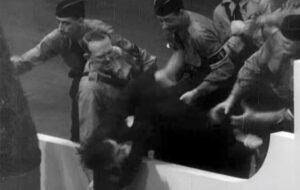
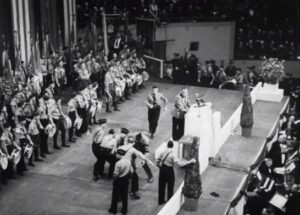 Looking back on how the Nazi history played out, and especially the atrocities of Hitler, I wonder if the people who were at the rally in support of Hitler felt about their…hero now. I suppose that being obsessed with evil, they might have been fine with the Holocaust, and all of the killing that took place. All we can hope is that maybe at least a few of then saw the error of their ways, and realized just how evil Hitler and the Third Reich really were.
Looking back on how the Nazi history played out, and especially the atrocities of Hitler, I wonder if the people who were at the rally in support of Hitler felt about their…hero now. I suppose that being obsessed with evil, they might have been fine with the Holocaust, and all of the killing that took place. All we can hope is that maybe at least a few of then saw the error of their ways, and realized just how evil Hitler and the Third Reich really were.
 Some holidays celebrate one thing and one thing only, but others, such as May Day, can have several meanings. When my sisters and I were children, May Day was a special day. Our mom, Collene Spencer would go to the story and buy candy. We made baskets out of construction paper and put candy in them. Then we would sneak around the neighborhood, hang the baskets on the front door of a neighbor and knock on the door. Then, we would run and hide. Sometimes they would catch us, and sometimes they would just yell out “thank you,” but they were always pleased that we though of them and did something nice for them.
Some holidays celebrate one thing and one thing only, but others, such as May Day, can have several meanings. When my sisters and I were children, May Day was a special day. Our mom, Collene Spencer would go to the story and buy candy. We made baskets out of construction paper and put candy in them. Then we would sneak around the neighborhood, hang the baskets on the front door of a neighbor and knock on the door. Then, we would run and hide. Sometimes they would catch us, and sometimes they would just yell out “thank you,” but they were always pleased that we though of them and did something nice for them.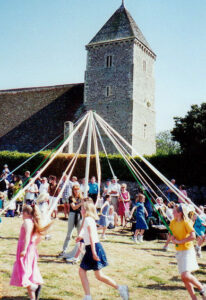
Many people look at May Day as celebrating the beginning of the summer season, or at least the warmer part of Spring. It is a day when it seems like suddenly the flowers have all begun to bloom, the grass gets green, and the trees got their leaves. That is a great way to think about it, because for me Spring and Summer are the best times of the year. I love being able to get out and hike and just enjoy the warm weather. Some of the celebrations included a Maypole dance where ribbons were wrapped around a pole to create a work of art. The ribbons are multi-colored, so its like braiding them together. Its a great game for the kids…and a great welcome to Summer!!
In the United States, May first has another meaning…it is also Law Day. These days it is questionable as to how people 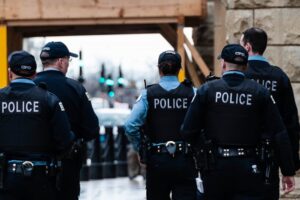 feel about that, but to me it is an important day. Our nation needs law and order, and I believe that most people would agree. Law Day is a day meant to reflect on the role of law in the foundation of the country and to recognize its importance for society. These days there are people who are against the police, except when they need one, and then suddenly the police are very important. I have and have had law enforcement officers in my family, and I can say that they are some of the most caring people I know. So to them I say Happy Law Day!! To everyone else, Happy May Day!!
feel about that, but to me it is an important day. Our nation needs law and order, and I believe that most people would agree. Law Day is a day meant to reflect on the role of law in the foundation of the country and to recognize its importance for society. These days there are people who are against the police, except when they need one, and then suddenly the police are very important. I have and have had law enforcement officers in my family, and I can say that they are some of the most caring people I know. So to them I say Happy Law Day!! To everyone else, Happy May Day!!
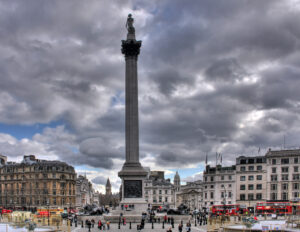 Protests are a common story these days, and the police are often kept busy for days trying to keep some kind of order. Not much has really changed in that arena. No nation is exempt from the possibility of violence breaking out because people feel they have been subjected to injustice…whether the facts bear out the belief or not. In 1926, miners across the United Kingdom went on strike. They were being subjected to an involuntary 13% wage cut, as well as an increase in weekly labor, and they were not planning to put up with it. When workers in other industries refused to work in solidarity with the striking miners, it led to a general strike. The work stoppage lasted nine days.
Protests are a common story these days, and the police are often kept busy for days trying to keep some kind of order. Not much has really changed in that arena. No nation is exempt from the possibility of violence breaking out because people feel they have been subjected to injustice…whether the facts bear out the belief or not. In 1926, miners across the United Kingdom went on strike. They were being subjected to an involuntary 13% wage cut, as well as an increase in weekly labor, and they were not planning to put up with it. When workers in other industries refused to work in solidarity with the striking miners, it led to a general strike. The work stoppage lasted nine days.
1926 was an unsettled year, with protests becoming quite common, especially 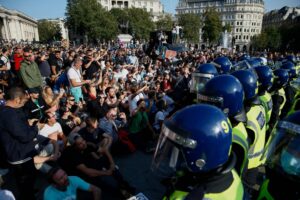 in London’s Trafalgar Square. As a result of the violence, the police wanted to set up a temporary police station, so they could keep an eye on things. The public would have none of it. Their outcry literally caused the police to drop the project. The problem, however, remained, so they knew that something had to be done. Finally, someone came up with a brilliant idea. That year, they built several large ornate light posts. One of the light posts was configured with the idea of housing what is most likely the world’s tiniest police station. This brilliant idea allowed the police to hide it, and their surveillance, in plain sight.
in London’s Trafalgar Square. As a result of the violence, the police wanted to set up a temporary police station, so they could keep an eye on things. The public would have none of it. Their outcry literally caused the police to drop the project. The problem, however, remained, so they knew that something had to be done. Finally, someone came up with a brilliant idea. That year, they built several large ornate light posts. One of the light posts was configured with the idea of housing what is most likely the world’s tiniest police station. This brilliant idea allowed the police to hide it, and their surveillance, in plain sight.
The police station pole was located inconspicuously at the south-east corner of Trafalgar Square. It is a rather 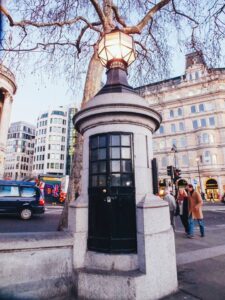 peculiar and often overlooked world record holder…Britain’s Smallest Police Station. Apparently this tiny box can accommodate up to two prisoners at a time, although its main purpose was to hold a single police officer. I guess you could say that it was a 1920’s version of the ring doorbell camera. It didn’t take video, but the officer inside could clearly watch the square. Once the light fitting was hollowed out, the builders installed a set of narrow windows in order to provide a vista across the main square. Also installed was a direct phone line back to Scotland Yard in case reinforcements were needed in times of trouble. In fact, whenever the police phone was picked up, the ornamental light fitting at the top of the box started to flash, alerting any nearby officers on duty that trouble was near. It was a brilliant idea, but as with all inventions, their usefulness lasts only until the next big thing comes along. Such was the case with the Trafalgar Square Light Pole Police Station. Eventually new technology made the little station obsolete. Today the pole is used for custodial storage.
peculiar and often overlooked world record holder…Britain’s Smallest Police Station. Apparently this tiny box can accommodate up to two prisoners at a time, although its main purpose was to hold a single police officer. I guess you could say that it was a 1920’s version of the ring doorbell camera. It didn’t take video, but the officer inside could clearly watch the square. Once the light fitting was hollowed out, the builders installed a set of narrow windows in order to provide a vista across the main square. Also installed was a direct phone line back to Scotland Yard in case reinforcements were needed in times of trouble. In fact, whenever the police phone was picked up, the ornamental light fitting at the top of the box started to flash, alerting any nearby officers on duty that trouble was near. It was a brilliant idea, but as with all inventions, their usefulness lasts only until the next big thing comes along. Such was the case with the Trafalgar Square Light Pole Police Station. Eventually new technology made the little station obsolete. Today the pole is used for custodial storage.
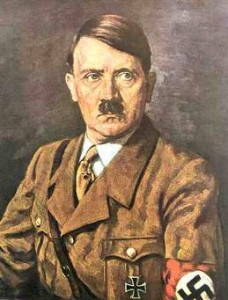 When Hitler took power in Germany, the first goal was to take away the guns from the people. He then dismantled the police, and set up his own police force…loyal only to him. This was the beginning of Hitler’s planned takeover…first of Germany, and then the world. That was his goal, but thankfully, the world fought back, and evil did not prevail.
When Hitler took power in Germany, the first goal was to take away the guns from the people. He then dismantled the police, and set up his own police force…loyal only to him. This was the beginning of Hitler’s planned takeover…first of Germany, and then the world. That was his goal, but thankfully, the world fought back, and evil did not prevail.
World War II had gone on for almost five years…long years. Hitler’s forces were reeling from the devastating effects of D-Day, and Paris was next in line for liberation, The Allied machine was marching in to Paris to remove the Nazi Regime. Hitler was furious, and decided that if his army was to be forced out, they would take the best of the memories and landmarks of Paris with them. He planned to leave the city in smoldering ruins. Hitler issued the first of several orders to the German commander of Paris, General Dietrich von Choltitz, to destroy the city. What Hitler had not anticipated, was that von Choltitz would not blindly do his bidding. The last last commander of Nazi-occupied Paris in 1944, von Choltitz disobeyed Adolf Hitler’s orders to destroy the city, and instead surrendered it to Free French forces when they entered the city on August 25th. Choltitz later asserted that his defiance of Hitler’s direct order stemmed from its obvious military futility, his affection for the French capital’s history and culture, and his belief that Hitler had by then become insane, while other sources point to the fact that he had little control of the city thanks to the operations of the resistance, and could not have carried out such orders. Nevertheless, von Choltitz has since been referred to as “The Saviour of Paris.”
As I look at the current circumstances in the United States, I am reminded of the days of Hitler’s reign of terror. The riots in the streets, the calls for gun control and defunding the police, and the removal of the statues marking our past…good and bad, are all reminiscent of the days of early World War II. Just as in the days of 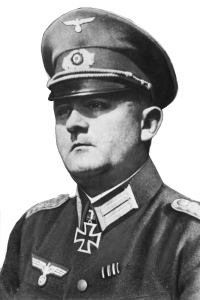 Hitler’s National Socialist Party, Socialism would not be good for America either. While the Democratic Party voters should understand that their values are like Hitler’s and yet, often blame the Republican party for being like Hitler, they are wrong. If they would look at history, instead of trying to remove our memory of the past, they would see just how alike Socialism is to Nazism and Hitler’s ways. Truly, the people of the United States need to wake up…and quickly. The decision to try to change our country to Socialism, is a slippery slope to communism, and the removal of the freedoms we hold so dear. We need to approach our future with our eyes wide open about the past of other nations, as well as the greatness that the American system of Capitalism has provided our nation with in the past. We like our freedom to let our voice be heard…a right that is found only in Capitalism. Don’t let the rights and privileges we so enjoy, be stolen from us by a handful of radical Socialists and Communists. The time to stand against Socialism and Communism is now!! Wake up America!!
Hitler’s National Socialist Party, Socialism would not be good for America either. While the Democratic Party voters should understand that their values are like Hitler’s and yet, often blame the Republican party for being like Hitler, they are wrong. If they would look at history, instead of trying to remove our memory of the past, they would see just how alike Socialism is to Nazism and Hitler’s ways. Truly, the people of the United States need to wake up…and quickly. The decision to try to change our country to Socialism, is a slippery slope to communism, and the removal of the freedoms we hold so dear. We need to approach our future with our eyes wide open about the past of other nations, as well as the greatness that the American system of Capitalism has provided our nation with in the past. We like our freedom to let our voice be heard…a right that is found only in Capitalism. Don’t let the rights and privileges we so enjoy, be stolen from us by a handful of radical Socialists and Communists. The time to stand against Socialism and Communism is now!! Wake up America!!
 Sometimes an evil leader can come in and before anyone realizes it, the danger that came in with him is real. Unfortunately, not every elected leader is a good one, and when an elected leader, begins to do things like taking away the guns of the people and undermining the police, you find out just how bad they really are. Hitler was that kind of elected leader, and worse. By May of 1934, Hitler had been the chancellor of Germany for 16 months, and the dictator for 14 months. Less than a month after Adolf Hitler was appointed chancellor of Germany, he calls on elements of the Nazi party to act as auxiliary police. The SS (Schutzstaffel), initially Hitler’s bodyguards, and the SA (Sturmabteilung, the German Assault Division), who were the street fighters or Storm Troopers of the Nazi party, now operated as the private army of the Nazi party. SS chief Heinrich Himmler also turned the regular (nonparty) police forces into an instrument of terror. He helped forge the powerful Secret State Police (Geheime Staatspolizei), or Gestapo. These non-uniformed police used ruthless and cruel methods throughout Germany to identify and arrest political opponents and others who refused to obey laws and policies of the Nazi regime. It had taken less than a year to change everything for the people of Germany, who no longer had a say in their own lives.
Sometimes an evil leader can come in and before anyone realizes it, the danger that came in with him is real. Unfortunately, not every elected leader is a good one, and when an elected leader, begins to do things like taking away the guns of the people and undermining the police, you find out just how bad they really are. Hitler was that kind of elected leader, and worse. By May of 1934, Hitler had been the chancellor of Germany for 16 months, and the dictator for 14 months. Less than a month after Adolf Hitler was appointed chancellor of Germany, he calls on elements of the Nazi party to act as auxiliary police. The SS (Schutzstaffel), initially Hitler’s bodyguards, and the SA (Sturmabteilung, the German Assault Division), who were the street fighters or Storm Troopers of the Nazi party, now operated as the private army of the Nazi party. SS chief Heinrich Himmler also turned the regular (nonparty) police forces into an instrument of terror. He helped forge the powerful Secret State Police (Geheime Staatspolizei), or Gestapo. These non-uniformed police used ruthless and cruel methods throughout Germany to identify and arrest political opponents and others who refused to obey laws and policies of the Nazi regime. It had taken less than a year to change everything for the people of Germany, who no longer had a say in their own lives.
While he had control, it was still not enough for the insane chancellor. Hitler, as we all know, would go on to annihilate millions of the Jewish people, as well as anyone else he considered an “undesirable” person. While I’m sure the leaders of the German government considered themselves safe, they would find out just how wrong they were on the Night of the Long Knives…also known as a Blood Purge, or putsch in German. By definition, a blood purge is “the elimination en masse by massacre or execution of individuals considered to constitute an untrustworthy or undesirable element within a party or movement. the elimination en masse by massacre or execution of individuals considered to constitute an untrustworthy or undesirable element within a party.” Hitler had decided that some of his own leaders, his trusted associates, could not be trusted. Maybe he was right, but he didn’t really have proof of his doubts. Nevertheless, He decided that there needed to be a blood purge and the Night of the Long Knives was born.
On June 30, 1934, it began, and continued on until July 2, 1934. During the purge of the Night of the Long Knives (Nacht der langen Messer) Hitler and the Nazi regime used the Schutzstaffel (SS) to deal with the perceived problem of Ernst Röhm and his Sturmabteilung (SA) brownshirts (the original Nazi paramilitary organization). The first thing Hitler did was to take out…or defund the police. Believe it or not, that took out the 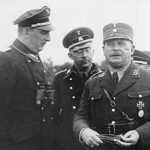 last protection of the people. He also took out past opponents of the party, thinking that they might organize against them. It is estimated that at least 85 people were murdered, but many historians think that the death toll was likely in the hundreds. Most of those killed were members of the SA, other victims included close associates of Vice Chancellor Franz von Papen, several Reichswehr (German Army) generals…one of whom, Kurt von Schleicher, was formerly the Chancellor of Germany. Hitler also took out their associates. Gregor Strasser, Hitler’s former competitor for control of the Nazi Party was the next to go. At least one person was killed in a case of mistaken identity, sadly, and several innocent victims were simply killed because they “knew too much.” The Night of the Long Knives…was Hitler’s insane revenge on anyone who dared to oppose him, or even to appear to oppose him.
last protection of the people. He also took out past opponents of the party, thinking that they might organize against them. It is estimated that at least 85 people were murdered, but many historians think that the death toll was likely in the hundreds. Most of those killed were members of the SA, other victims included close associates of Vice Chancellor Franz von Papen, several Reichswehr (German Army) generals…one of whom, Kurt von Schleicher, was formerly the Chancellor of Germany. Hitler also took out their associates. Gregor Strasser, Hitler’s former competitor for control of the Nazi Party was the next to go. At least one person was killed in a case of mistaken identity, sadly, and several innocent victims were simply killed because they “knew too much.” The Night of the Long Knives…was Hitler’s insane revenge on anyone who dared to oppose him, or even to appear to oppose him.
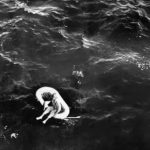 Arthur Duperrault dreamed of sailing the high seas. He was a World War II veteran from Green Bay, Wisconsin and he wanted to give his family a sailing adventure. The winter of 1960 was rough, but now the winter of 1961, would be one of sunlight and warmth. Arthur, Jean, Brian, Terry Jo, and Renee, were heading for the Bahamas to soak up some sun. Arthur and his family headed to Fort Lauderdale, Florida, where their boat, Bluebelle was waiting for them. It was a sixty foot two-masted sailboat.
Arthur Duperrault dreamed of sailing the high seas. He was a World War II veteran from Green Bay, Wisconsin and he wanted to give his family a sailing adventure. The winter of 1960 was rough, but now the winter of 1961, would be one of sunlight and warmth. Arthur, Jean, Brian, Terry Jo, and Renee, were heading for the Bahamas to soak up some sun. Arthur and his family headed to Fort Lauderdale, Florida, where their boat, Bluebelle was waiting for them. It was a sixty foot two-masted sailboat.
With no real sailing experience, Arthur hired a man named Julian Harvey, who was a decorated Air Force bomber pilot who had served in World War II and the Korean War, to captain for him. Harvey brought along his wife of four months, Mary Dene. On Wednesday, November 8, 1961, Arthur, Julian, and their respective families began their journey. Soon, the occupants of Bluebelle would be in the Bahamas. First, Harvey steered Bluebelle toward Bimini, a miniature island chain. Then headed east, to Sandy Point, a village located on the southwest point of the Great Abaco Island. Here, the vacationers filled their days with snorkeling and picking up shells on the beautiful beaches.
On Sunday, November 12, 1961, Arthur and Julian went to the office of Roderick Pinder, who was Sandy Point’s commissioner, to fill out the forms that they needed to properly leave the Bahamas. Arthur told Roderick. “We’ll be back before Christmas.” Little did Arthur, his wife, or three children know, they would not be coming back for Christmas. Sunday would be Arthur’s last night alive. It would also be last night alive for Jean, Brian, Renee, and Julian Harvey’s wife, Mary Dene. Sunday dinner was cooked by Mary Dene, who made a chicken cacciatore and salad for the two families. At 9:00 pm that night, Terry Jo went to bed. Her room was in a small cabin in the back of the boat. Usually, Renee, her young sister, slept there too, but tonight, she was with her mom, dad, and brother in the cockpit. In the middle of the night, Terry Jo heard her brother scream, “Help, daddy, help!” The screams were followed by running and stamping noises. Terry Jo was terrified. After the running, the stamping, and the screams stopped, there was an eerie silence.
Terry Jo was terrified, but found the courage to leave her cabin. The main cabin, a kitchen and dining room during the day, transformed into a bedroom at night. There she saw her mom and big brother, in a pool of blood…dead. Cautiously, she went to check the other areas of the boat. Near the cockpit, she saw more blood and a knife. She made her way to the front of the boat. As Terry Jo was viewing the horror in front of her, somebody lunged at her. It wasn’t a stranger…it was the captain, Julian Harvey. “Get back down there!” he  screamed. With her heart pounding, Terry Jo went back to her cabin. She crawled into her bunk. Soon, water coming into the cabin told her that Bluebelle was sinking. She was too afraid to move. However, Harvey was moving all over the place. Soon, she saw Harvey in the doorway holding her big brother’s rifle. Then Harvey turned and walked out of the cabin, and she heard him climb the stairs back to the upper deck.
screamed. With her heart pounding, Terry Jo went back to her cabin. She crawled into her bunk. Soon, water coming into the cabin told her that Bluebelle was sinking. She was too afraid to move. However, Harvey was moving all over the place. Soon, she saw Harvey in the doorway holding her big brother’s rifle. Then Harvey turned and walked out of the cabin, and she heard him climb the stairs back to the upper deck.
With water reaching the top of her mattress, Terry Jo knew she had to get out. Wading through the water, she climbed to the deck again. On deck she saw that the ship’s dinghy and rubber life raft were floating beside the boat. “Is the ship sinking?” she called out. “Yes!” Harvey shouted, coming up from behind her. He pushed the line to the dinghy into her hands. “Hold this!” he shouted. Numb from shock, Terry Jo let the line slip through her fingers. The dinghy slowly drifted away from the sinking Bluebelle. Harvey jumped overboard to catch it, and Terry Jo watched him swim after the dinghy and disappear into the night. She remembered the cork life float that was kept lashed to the top right side of the main cabin, which was now just barely above-water. She scrambled to the small, oblong float and quickly untied it. Just as the float came free, the boat deck sank beneath her feet. She pushed the float into the open water, and climbed onto the float. One of its lines snagged on the sinking ship. For a moment, she and the float were pulled underwater as the Bluebelle went down. Then the line came free, and they popped back to the surface. She huddled low on the float, afraid that the captain might be coming back. She had no water, no food, and nothing to protect her from the cold. The night was so dark that she couldn’t see anything.
For three days Terry Jo was battered by the salt water, and scorched by the sun…her only companions, a pod of porpoises. She had no food or water. Each day brought her closer to death. On Tuesday, a small red plane circled overhead. She waved at it for a long time with her blouse. The plane passed directly over her, but at an angle that made it impossible for the pilots to see her. When the sun rose on Thursday, she did not feel its burning rays. She was in a deep sleep close to death. Only the faintest spark of life was left. About midmorning she emerged from her stupor and opened her eyes. A huge shadow loomed above her like a great beast. Its rumble was so deep that she could feel its pounding rhythm in her chest. It seemed like a dream, until she looked up to the top of that great wall, and saw heads and waving arms. She could hear voices shouting. Finally, she felt herself lifted from the water. She passed out again. Terry Jo spent 11 days in a Miami hospital but had no permanent injuries
The day after the Bluebelle went down, an oil tanker spotted Harvey. When the captain pulled the tanker closer, he yelled, “My name is Julian Harvey. I am master of the Bluebelle.” In the days that followed, Harvey told the Coast Guard in Miami that he was the sole survivor of a grave accident. In the middle of the previous night, he said that a sudden squall damaged the sailboat. His wife, Mary Dene, and the Duperraults were injured when the masts and rigging collapsed. Gas lines in the engine room ruptured, and the ship caught fire as it sank. Harvey said he had managed to get in the dinghy, but tangled rigging trapped everyone else on board. A few days later, staying at the Sandman Hotel, Harvey heard that Terry Jo had survived. The next day, a maid at the hotel found Harvey’s bloody, lifeless body on the floor. He had killed himself.

A week after her rescue, officials questioned Terry Jo in her hospital bed. Her story, disproved Harvey’s account. Her father, mother, brother, and younger sister, along with Mary Dene Harvey, had been slaughtered aboard the Bluebelle, at the hands of Julian Harvey. The police suspect that Harvey killed his wife to collect money from her life insurance, and one theory suggests that Duperrault caught Harvey in the act, prompting the other murders. Terry Jo returned to Green Bay to live with her father’s sister and three cousins. When she was 12, she changed her name to Tere. Nearly 50 years later, in 2010, Tere finally revealed the details of the night her family was killed and her days spent drifting in open water in her book, Alone: Orphaned on the Ocean.
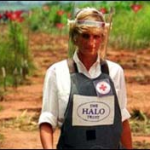
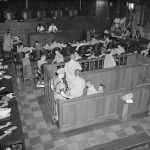 We all know that war is a nasty, messy, vicious event. Nevertheless, sometimes war is necessary. Unfortunately, in our world, evil exists, and sometimes the evil is in the form of a dictator, a nation, or a religious group. Wars might be fought differently, but the end result is the same…death and destruction. Still, most wars have an ending point. One side surrenders, and admits defeat. That might seem like the end of the story, but it isn’t. All too often the process of cleaning up the mess after the war, takes far longer than the war itself. In fact, sometimes the cleanup never really happens at all. Such was the case with landmines in Angola. These mines are a legacy of over four decades of fighting during a 14 year war of independence against its former colonial ruler of Portugal and another 30 years of civil war. Like people who put signs up to advertise a garage sale, sometimes they don’t remember where all the landmines were, or maybe they did, and simply didn’t care. Either way, the landmines were killing and maiming people…innocent people. That was the mission my 16th cousin once removed, Princess Diana took upon herself. She wanted an international ban on landmines. Her comments, which were made during a January 15, 1997 visit to Angola to see for herself some of the victims of landmines, were seen as out of step with government policy by the Junior Defense Minister, Earl Howe, who described the princess as a “loose cannon”, ill-informed on the issue of anti-personnel landmines. Nevertheless, Diana was right about the weapons of war that were left behind. The task of cleaning up the mess may have been a daunting one, but the result of leaving them behind was gruesome.
We all know that war is a nasty, messy, vicious event. Nevertheless, sometimes war is necessary. Unfortunately, in our world, evil exists, and sometimes the evil is in the form of a dictator, a nation, or a religious group. Wars might be fought differently, but the end result is the same…death and destruction. Still, most wars have an ending point. One side surrenders, and admits defeat. That might seem like the end of the story, but it isn’t. All too often the process of cleaning up the mess after the war, takes far longer than the war itself. In fact, sometimes the cleanup never really happens at all. Such was the case with landmines in Angola. These mines are a legacy of over four decades of fighting during a 14 year war of independence against its former colonial ruler of Portugal and another 30 years of civil war. Like people who put signs up to advertise a garage sale, sometimes they don’t remember where all the landmines were, or maybe they did, and simply didn’t care. Either way, the landmines were killing and maiming people…innocent people. That was the mission my 16th cousin once removed, Princess Diana took upon herself. She wanted an international ban on landmines. Her comments, which were made during a January 15, 1997 visit to Angola to see for herself some of the victims of landmines, were seen as out of step with government policy by the Junior Defense Minister, Earl Howe, who described the princess as a “loose cannon”, ill-informed on the issue of anti-personnel landmines. Nevertheless, Diana was right about the weapons of war that were left behind. The task of cleaning up the mess may have been a daunting one, but the result of leaving them behind was gruesome.
Of course, these weren’t the only messes that needed to be cleaned up after a war. There were buildings to be rebuilt, the dead to bury, the economy to build up, and the government often had to be restructured. The country might have been the enemy, but if things weren’t handled right after the surrender, the same evil people might move right back into power. Of course, cleaning up the mess…often known as policing the nation that has now surrendered, is no easy task either. Most people don’t want the winning army there. Their country is nothing like it used to be. Some believe that is a good thing, but it was still their home, and now everything feels…wrong. Their homes are destroyed, food is can be scarce…water too. Everything they have known for their whole life is gone. No wonder they don’t want the army there…or maybe they secretly do, because their home has become just a very scary place. I suppose that is why a part of the surrender agreements include restoration of the country, and the new government and police.
One more part of cleaning up the mess is the task of trying the perpetrators for their war crimes. That was the main reason that Hitler took his own life. He knew that he would be tried and convicted of the crimes he had committed, and he couldn’t face what would follow. He would have been left to the mercy of his countrymen, 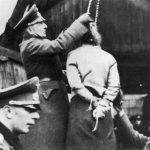
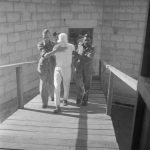 and he would have ended up being hung, like Saddam Hussein was for his war crimes. A dictator can’t brutally kill the people who he is in power over and not be hated…truly hated, no matter what the people act like when they are forced to act loyal. The trials for war crimes in many ways seems to the world, as if one nation is trying to be the world police. The United States has been accused of this before, but the reality remains, that someone has to try these evil criminals, and someone has to clean up the mess. In the absence of another nation to step up, the job usually falls to the United States.
and he would have ended up being hung, like Saddam Hussein was for his war crimes. A dictator can’t brutally kill the people who he is in power over and not be hated…truly hated, no matter what the people act like when they are forced to act loyal. The trials for war crimes in many ways seems to the world, as if one nation is trying to be the world police. The United States has been accused of this before, but the reality remains, that someone has to try these evil criminals, and someone has to clean up the mess. In the absence of another nation to step up, the job usually falls to the United States.
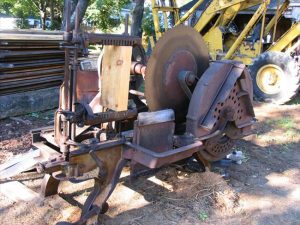 Since I’m not in the manufacturing trade, especially where wooden shingles are concerned, I had no idea that there was a trade called shingle weaving. I would assume that if shingle weaving is still done today, it is probably done by machine, because I would think that this rather dangerous occupation is one that not too many people would voluntarily put themselves into. Shingle weaving, for those who don’t know, was an extremely dangerous process in which the shingle weaver hand-fed pieces of raw wood onto an automated saw. Despite the danger of the profession, the industry was a large one throughout Washington and Oregon and by 1893 Washington state alone had 150 mills which converted Western Red Cedar into shingles and shakes for the roofing and siding of American homes. The workers normally worked ten hour shifts, standing in front of two steel saw blade disks whirling at a speed of two hundred rounds a minute. With his left hand he is feeding blocks of cedar wood into the saw, and with his right hand, he is examining the wood that came out of the left saw for knot holes to be cut out by the saw blade disk in front of him. The worker cannot stop what his right hand and his eyes are doing to see where his left hand is, creating a situation whereby his left hand could easily be cut up or even off, if he doesn’t have a good feel for where his hand is at all times in relation to that left saw blade disk. It doesn’t take much imagination to picture the concerns the workers had.
Since I’m not in the manufacturing trade, especially where wooden shingles are concerned, I had no idea that there was a trade called shingle weaving. I would assume that if shingle weaving is still done today, it is probably done by machine, because I would think that this rather dangerous occupation is one that not too many people would voluntarily put themselves into. Shingle weaving, for those who don’t know, was an extremely dangerous process in which the shingle weaver hand-fed pieces of raw wood onto an automated saw. Despite the danger of the profession, the industry was a large one throughout Washington and Oregon and by 1893 Washington state alone had 150 mills which converted Western Red Cedar into shingles and shakes for the roofing and siding of American homes. The workers normally worked ten hour shifts, standing in front of two steel saw blade disks whirling at a speed of two hundred rounds a minute. With his left hand he is feeding blocks of cedar wood into the saw, and with his right hand, he is examining the wood that came out of the left saw for knot holes to be cut out by the saw blade disk in front of him. The worker cannot stop what his right hand and his eyes are doing to see where his left hand is, creating a situation whereby his left hand could easily be cut up or even off, if he doesn’t have a good feel for where his hand is at all times in relation to that left saw blade disk. It doesn’t take much imagination to picture the concerns the workers had.
On May 1, 1916, the workers decided that they weren’t receiving enough pay for this very dangerous occupation, and the mill owners disagreed, so the Everett Shingle Weavers Union went on strike. The strike was quickly settled, in favor of the mill owners, at all but the Jamison Mill. It was at this point that the Industrial Workers of the World (IWW) got involved. A 1909 IWW strike in Spokane had cost the city over $250,000, a great deal of money at that time, so when the IWW came to Everett, the city government quickly became quite nervous. When IWW organizer and speaker James Rowan arrived in Everett on June 30, 1916, Everett became the home of the IWW’s newest Free Speech Fight. The fight, while starting out relatively peacefully, escalated when Rowan chose the corner of Hewitt and Wetmore, where public speaking was illegal, to begin his work…even though free speech was legal at other corners. I’m sure his plan was to provoke the city government in any way he could, and maybe to bring in the press. Speakers were arrested and released, keeping the jail busy for a month and a half. The delicate balance of the negotiation process continued until August 19, 1916, when violence broke out at the Jamison Mill. It was Strike Breakers against the picketers, which is usually how those things go. The mill owners didn’t have to be involved, because when people ran out of money, they had little choice but to go back to work. Those left, didn’t like the line crossing strike breakers. The police didn’t get involved, because they said the fight was on private property, and so didn’t concern them.
On October 30, all that changed when 41 IWW members came by ferry to Everett, to speak at the now notorious corner of Hewitt and Wetmore. The Sheriff and his deputies beat these men, took them to Beverly Park, and forced them to run through a gauntlet of “law and order” officials, armed with clubs and whips. After that horrific incident, the IWW organized a group of 300 men to board the steamers Verona and Calista from Seattle and head north toward Port Gardner Bay, on November 5 for a free 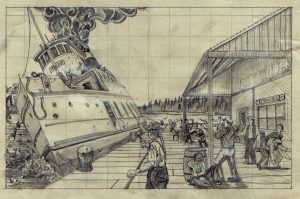 speech rally. The event ended in gun battle now known as the Everett Massacre, in which 5 strikers and 2 vigilantes calling themselves “citizen deputies” were killed and approximately 45 others wounded. The vigilantes met the IWW free speech protesters, who were on the Verona, at the dock. As the gunfire ensued, the men on the Verona ran to the opposite side, almost capsizing it. Some fell off and drown. Few of the men on the Verona had weapons, and so were defenseless. The vigilantes who were inexperienced in this type of fighting, were careless in their aim, and so in the end, many of the vigilantes who were killed or wounded were shot in the back by their own group. The massacre, also known as Everett’s Bloody Sunday, was the bloodiest battle in Pacific Northwest labor history.
speech rally. The event ended in gun battle now known as the Everett Massacre, in which 5 strikers and 2 vigilantes calling themselves “citizen deputies” were killed and approximately 45 others wounded. The vigilantes met the IWW free speech protesters, who were on the Verona, at the dock. As the gunfire ensued, the men on the Verona ran to the opposite side, almost capsizing it. Some fell off and drown. Few of the men on the Verona had weapons, and so were defenseless. The vigilantes who were inexperienced in this type of fighting, were careless in their aim, and so in the end, many of the vigilantes who were killed or wounded were shot in the back by their own group. The massacre, also known as Everett’s Bloody Sunday, was the bloodiest battle in Pacific Northwest labor history.

